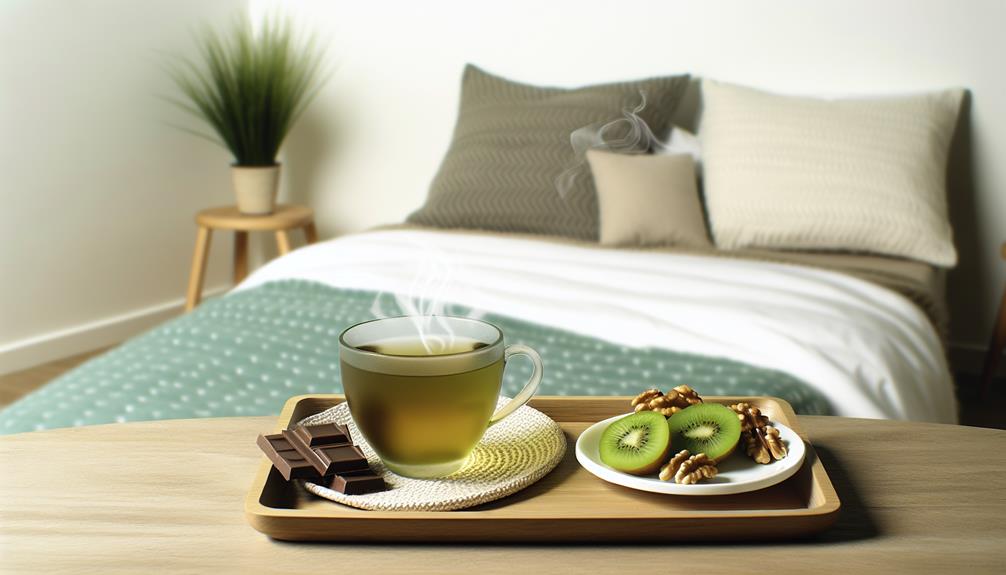We get it. Life can be hectic, and sometimes it feels like there just aren’t enough hours in the day to get a good night’s sleep. But here’s the thing – prioritizing quality sleep is not a luxury, but a necessity.
So, if you’re ready to finally achieve the restful night’s sleep you deserve, then join us as we explore some valuable tips on how to celebrate World Sleep Day.
In this discussion, we’ll uncover the importance of a good night’s sleep and the benefits it brings to our overall well-being. We’ll also touch on the effects of poor sleep and provide actionable tips for better sleep.
So, are you ready to discover the path to a truly restful night’s sleep? Let’s dive in.
Importance of a Good Night’s Sleep

Getting a good night’s sleep is crucial for our overall well-being and plays a significant role in maintaining good health. When we prioritize quality sleep, we reap numerous benefits that enhance our daily lives.
Firstly, good sleep boosts cognitive function, allowing us to think clearly and make better decisions. It also improves memory, helping us retain information more effectively.
Additionally, quality sleep promotes emotional regulation and stress management, enabling us to navigate challenging situations with ease. Restful sleep even improves our relationships and interpersonal skills, as we’re more patient and empathetic when well-rested.
Moreover, adequate sleep helps repair and rejuvenate our bodies, enhancing our physical appearance.
Benefits of Good Sleep
Quality sleep is like a secret weapon that empowers us to excel in every aspect of our lives. When we prioritize good sleep, we unlock a multitude of benefits that enhance our well-being and liberate us from the constraints of fatigue and poor health. Here are some of the incredible advantages that come with getting a restful night’s sleep:
- Improved cognitive function and sharper decision-making abilities.
- Enhanced memory and better retention of information.
- Increased emotional regulation and improved stress management skills.
- Stronger relationships and better interpersonal skills.
Effects of Poor Sleep

Poor sleep can have a profound impact on various aspects of our lives. It affects not only our physical health but also our mental well-being and social interactions.
When we don’t get enough sleep or experience poor sleep quality, our bodies and minds suffer the consequences. Physically, we may experience fatigue, decreased immune function, and an increased risk of developing health conditions like heart disease.
Mentally, poor sleep can lead to decreased cognitive function, impaired decision-making abilities, and emotional instability. Socially, our relationships and interactions with others may be negatively affected. We may feel irritable or have difficulty focusing and connecting with others.
It’s important to prioritize sleep and establish healthy sleep habits to prevent these negative effects and improve our overall well-being.
Establish a Consistent Sleep Routine
Establishing a consistent sleep routine is key to ensuring a restful night’s sleep and optimizing our overall well-being. To achieve this, we can follow these simple steps:
- Set a regular bedtime and wake-up time: By going to bed and waking up at the same time every day, our bodies will establish a natural sleep-wake cycle, making it easier to fall asleep and wake up feeling refreshed.
- Create a bedtime routine: Engaging in relaxing activities like reading a book, taking a warm bath, or practicing deep breathing exercises can signal to our bodies that it’s time to wind down and prepare for sleep.
- Make your sleep environment comfortable: Ensure your bedroom is cool, dark, and quiet, and invest in a comfortable mattress and pillows for optimal sleep quality.
- Minimize screen time before bed: The blue light emitted by electronic devices can interfere with our natural sleep patterns, so it’s best to avoid screens at least an hour before bedtime.
Create a Relaxing Sleep Environment

To create an environment conducive to a restful night’s sleep, it’s important to set the stage for relaxation and tranquility. Our sleep environment plays a significant role in promoting deep and rejuvenating sleep.
Start by decluttering your bedroom, removing any unnecessary items that may cause visual distractions. Choose soft, breathable bedding and invest in a comfortable mattress that supports your body.
Consider using blackout curtains or an eye mask to block out any unwanted light. Use soothing colors and calming scents, such as lavender, to create a peaceful atmosphere. Keep the temperature cool and ensure proper ventilation for fresh air circulation.
Engage in Regular Physical Activity
Engaging in regular physical activity is a key component to achieving a restful night’s sleep. When we incorporate exercise into our daily routine, it positively impacts our sleep patterns and overall well-being.
Here are some reasons why regular physical activity promotes better sleep:
- Increased sleep duration: Exercise helps to regulate our internal body clock, leading to longer and more restful sleep.
- Improved sleep quality: Physical activity helps to reduce stress and anxiety, allowing us to fall asleep faster and experience deeper sleep.
- Enhanced daytime alertness: Regular exercise improves our energy levels during the day, making us feel more awake and alert.
- Reduced sleep disturbances: Engaging in physical activity can alleviate symptoms of sleep disorders, such as insomnia or sleep apnea.
Mindful Food and Drink Choices

Regular physical activity sets the foundation for a restful night’s sleep.
Now, let’s explore the importance of making mindful food and drink choices to further enhance our sleep quality.
What we consume before bedtime can have a significant impact on our sleep patterns and overall well-being.
To promote a restful night’s sleep, it’s important to choose foods and beverages that support relaxation and digestion.
Opt for foods that are rich in tryptophan, such as turkey, nuts, and seeds, as it helps promote the production of serotonin, a neurotransmitter that aids in sleep regulation.
Avoid consuming heavy meals close to bedtime, as they can cause discomfort and disrupt sleep.
Additionally, limit your intake of caffeine, alcohol, and sugary drinks, as they can interfere with sleep quality and lead to restlessness throughout the night.
Blissy Products for Better Sleep
Blissy products offer a luxurious and effective solution for achieving a better night’s sleep. Made from silk, Blissy Silk Pillowcases provide enhanced comfort and softness, allowing you to sink into a state of pure relaxation.
The silk surface of these pillowcases not only feels amazingly smooth against your skin but also offers a cooling effect and moisture-wicking properties, preventing night sweats and promoting comfort throughout the night.
Additionally, Blissy Silk Sleep Masks are designed to enhance relaxation and promote deeper sleep. With their soft and gentle touch, these masks create a soothing environment, blocking out any unwanted light and helping you drift off into a peaceful slumber.
Say goodbye to restless nights and hello to blissful sleep with Blissy products.
Conclusion: Celebrating World Sleep Day

Celebrating World Sleep Day, we reflect on the importance of prioritizing restful nights and the impact it has on our overall well-being. It’s a reminder that sleep isn’t a luxury, but a necessity for our mental and physical health.
As we go about our busy lives, it can be easy to overlook the significance of sleep, but World Sleep Day serves as a wake-up call to prioritize our rest. By making simple changes to our sleep habits, such as maintaining a consistent bedtime routine and creating a calm sleep environment, we can experience the benefits of quality sleep.
Improved cognitive function, emotional regulation, and physical health are just a few of the rewards that await us when we prioritize restful nights. So let’s celebrate World Sleep Day by embracing the gift of sleep and reaping the countless benefits it brings to our lives.
Frequently Asked Questions
What Are Some Common Sleep Disorders and How Do They Affect Sleep Patterns?
Some common sleep disorders include insomnia, sleep apnea, and restless leg syndrome. These disorders can disrupt sleep patterns and prevent deep, restful sleep.
Insomnia is characterized by difficulty falling asleep or staying asleep.
Sleep apnea involves pauses in breathing during sleep, leading to frequent awakenings.
Restless leg syndrome causes uncomfortable sensations in the legs, often leading to movement and difficulty staying asleep.
These disorders affect sleep quality and can result in fatigue, decreased cognitive function, and other health issues.
How Does Sleep Deprivation Impact Mental Health and Job Performance?
Sleep deprivation can have a significant impact on our mental health and job performance. When we don’t get enough sleep, we may experience difficulties with concentration, memory, and decision-making. This can lead to decreased productivity and performance at work.
Additionally, lack of sleep can negatively affect our mood, causing irritability, anxiety, and even depression.
It’s important to prioritize sleep and ensure we get enough restful nights to maintain our mental well-being and excel in our jobs.
What Are Some Physical Health Problems That Can Arise From Inadequate Sleep?
Inadequate sleep can lead to a range of physical health problems. It weakens the immune system, making us more susceptible to illnesses. Lack of sleep also increases the risk of heart disease, high blood pressure, and obesity.
Additionally, it can impair glucose metabolism, leading to a higher risk of diabetes. Furthermore, inadequate sleep can negatively impact our hormonal balance, affecting appetite regulation and causing weight gain.
It’s crucial to prioritize quality sleep to maintain optimal physical health.
How Can Sleep Disorders Affect Relationships and Social Interactions?
Sleep disorders can have a significant impact on relationships and social interactions. When someone is constantly tired due to a sleep disorder, they may be irritable, moody, or have difficulty concentrating, which can strain relationships.
In social settings, a lack of quality sleep can lead to decreased energy and engagement, making it harder to connect with others. Additionally, sleep disorders can cause disruptions in sleep patterns, leading to sleep disturbances for partners or roommates, further affecting relationships.
It’s important to address sleep disorders to maintain healthy social connections.
What Are Some Effective Prevention and Management Strategies for Sleep Disorders?
Some effective prevention and management strategies for sleep disorders include:
- Maintaining a consistent sleep schedule
- Practicing relaxation techniques before bed
- Creating a comfortable sleep environment
- Engaging in regular physical activity
It’s important to prioritize sleep and seek professional help if needed.
Conclusion
In conclusion, as we celebrate World Sleep Day, it’s important to prioritize our sleep and understand its impact on our overall well-being.
By embracing the benefits of quality sleep and being aware of the consequences of poor sleep, we can take proactive steps towards achieving a restful night’s sleep.
From establishing a consistent bedtime routine to creating a relaxing sleep environment, and even incorporating Blissy Products for enhanced comfort, we can pave the way towards a healthier and more rejuvenating sleep experience.
So, here’s to celebrating World Sleep Day and embracing the path to a truly restful night’s sleep.





